
20 minute read
Television Dramas Nakamachi Ayako
Television Dramas
TV Dramas Raising Questions about Our Mindset
Advertisement
Nakamachi Ayako
Tension Created in Original Scenarios of Mystery Dramas
In 2019, a mystery drama produced from an original script and delivered simultaneously on SNS and VOD attracted attention. Your Turn to Kill (Anata no ban desu, i.e. ‘It’s your turn’) (NTV) was neither based on a novel nor a manga but it was the viewers who solved the mysteries and guessed the perpetrator (referred to as ‘examine’) on SNS, which created excitement for them. The newlywed couple Tezuka Shota (played by Tanaka Kei) and Nana (Harada Tomoyo) move to a new apartment and get involved in a murder game. It begins as a small talk at the monthly residents’ meeting and those who are involved get killed one after another. This drama series was broadcast for six months although most series usually conclude in three months. One of the main characters, Nana, is killed in the last episode of Season I and the theme of Season II is “revenge”. Many characters appeared in the series and someone was killed every week. It was an entertainment proactively arousing the viewers’ interest through SNS and this new approach drew attention. Conceived and planned by Akimoto Yasushi, script by Fukuhara Mitsunori.
Mr. Hiiragi’s Homeroom (3-nen A-gumi: Ima kara mina san wa hitojichi desu, i.e. ‘3rd Grade A Class–You’ve now been taken hostage’) (NTV) was an original mystery drama set at a high school. The homeroom teacher Hiiragi Ibuki (Suda Masaki) takes his students hostage and barricades himself inside the school for ten days, just before their graduation. Hiiragi makes his students “take this class” in order to think for themselves and find out the truth about the death of their classmate (Kamishiraishi Moka) who committed suicide six months ago. The teacher relentlessly questions his students who avoid looking at the truth and their dialogue is full of tension. The setting is quite extreme such as threatening to blow up the school building or that giving the wrong answer means someone has to die but it passionately raises a question that the young people of today should be confronting. The script was written by Muto Shogo. The series won the Grand Prize of the Drama Series category and Suda Masaki won the Prize for Best Leading Actor of the Tokyo Drama Awards 2019. Suda also won the Individual Award in the TV category of the 56th Galaxy Awards (the programme dele was also considered).
Dramas Set in Workplaces Depicting Recent Work Styles
Different ways of thinking among generations often create dramatic situations at work. ‘The Work Style Reform Bill’ was partially put into effect in April 2019 and brought about major changes in people’s mentality, especially regarding the long-hour working environment. The Tuesday Drama Series No Working After Hours!
(Watashi, teiji de kaerimasu, i.e. ‘I’m Going Home at a Fixed Hour’) (TBS), aired from April, highlighted the confusion and the different ways of thinking among working people. The secondary title of the first episode was “For the Era of a New Working Style! The Woman Who Always Left Work at the Fixed Hour”. Higashiyama Yui (Yoshitaka Yuriko) is a software development director. She finishes work at the fixed hour and enjoys her time after work at her favourite restaurant. She gradually changes the mindset of her co-workers and clients who cannot break away from the practice of working long hours and from power harassment. The heroine’s easy-going mode of living was suggested to the viewers. Based on the novel by Akeno Kaeruko, the script was written by Okudera Satoko and Shimizu Yukako. The drama series won the Monthly Galaxy Award in June 2019.
The heroine showing her resolute attitude at her workplace in Drama 10: We Can’t Pay You for This! (Kore wa keihi de ochimasen!, i.e. ‘Cannot spend company expense on this!’) (NHK) was exhilarating. Moriwaka Sanako (Tabe Mikako) works in the accounting department of a company making soaps and bath salts. She performs her role, processing each account by making precise judgements. By doing so, she cuts through each section’s old ways of doing things, which eventually eases the rigid organizational climate. Based on Aoki Yuko’s manga We Can’t Pay You for This! Ms. Morikawa of Accounting Department, the script was written by Watanabe Chiho, Fujihira Hisako and Hiruta Naomi.
An excellent drama depicting the realities and difficult situations that the staff of television companies experience also attracted attention. The HTB 50th Anniversary Drama: Channeru wa sonomama! (i.e. ‘Stay tuned!’) (Hokkaido Television) is based on the manga with the same title by Sasaki Noriko, who gathered materials from Hokkaido Television to write the story. Yukimaru Hanako (Yoshine Kyoko) is a less-than-able reporter, who has just joined the news department of the Hokkaido Hoshi Television. She exerts herself in a bold and dashing manner, which is her own unique way of doing things. Her demeanour was depicted vividly in the drama. The script was written by Mori Hayashi. The drama won the Grand Prize in the TV Drama category of the Awards presented by The National Association of Commercial Broadcasters in Japan in 2019.
Srou na bushi ni shitekure-Kyoto satsueijo rapusodi (i.e. ‘Make it a slow warrior – Kyoto Studio Rhapsody’) (NHK) was about creating a period drama using NHK’s state-of-the-art equipment such as drones and high-speed cameras that were brought on location. It was a piece of entertainment shown in the style of behind-thescenes drama. The passion of the actors and the staff’ struggling with the latest technology was conveyed in a refreshing tone and manner. Minamoto Takashi both wrote and directed this drama, which won the 74th Agency for Cultural Affairs National Arts Festival Award for Excellence in the TV Drama category in 2019.
Looking at the Essence of the Characters’ Loose Bonds
There were appealing TV dramas that made us look at things in our daily lives that are important for us and gradually changed our way of thinking. Drama 24: What Did You Eat Yesterday? (Kinou nani tabeta?) (TV Tokyo) depicted the everyday life of the lawyer Shiro-san (Nishijima Hidetoshi) and the hairdresser Kenji (Uchino Seiyo), who are lovers living together, focusing on them sitting down at the dinner table. Shiro-san is passionate about cooking dinner and when the two men have dinner together, they show their deep affection for each other. Fulfillment and warmth could be felt from the depiction of their everyday life. The script based on the manga by Yoshinaga Fumi was written by Adachi Naoko.
The Tuesday Drama: You and I on G String (G sen jou no anata to watashi) (TBS) portrays the traumas, confusions and hesitations of the twenty-five year old office worker Kogure Yaeko (Haru), the forty-one year old housewife Kitagawa Yukie (Matsushita Yuki), the nineteen-year old college student Kase Rihito (Nakagawa Taishi) and the instructor Kuzumi Mao (Sakurai Yuki), who have met at a violin class run by a musical instrument store. They cannot find a way out of their adverse situations and what the characters go through in their minds is depicted at a slow pace. The script was written by Adachi Naoko based on a manga by Ikueumi Ryo.
The same goes for Saturday Drama:If Talking Paid, My Story is Long (Ore no hanashi wa nagai) (Nippon TV). The protagonist
Kishibe Mitsuru (Ikuta Toma) is a thirty-one year old ‘NEET’ (i.e. Not in Education, Employment or Training) and lives with his mother Fusae (Harada Mieko). He quits university and starts running a coffee shop, which has been his dream, but it does not work out. He has not had a regular job for six years. It is a domestic drama that begins when his elder sister Akiba Ayako (Koike Eiko), her husband Koji (Yasuda Ken), and their young daughter Harumi (Kiyohara Kaya) return to their mother’s house to live together for a while. Driven by his strong-minded elder sister, Mitsuru’s pointless arguments heat up. Through their dialogues, their true feelings slip out and Mitsuru and the other members of the family slowly find a chance to move forward. It was a drama series using an original script. Each episode was thirty minutes long and two episodes were broadcasted every time. The script was written by Kaneko Shigeki, the chief producer was Ikeda Kenji and the producers were Hazeyama Hiroko and others.
There were other dramas about slowly moving through life. One of them was The Man Who Can’t Get Married Yet (Mada kekkon dekinai otoko)(Fuji TV, starring Abe Hiroshi, script by Ozaki Masaya), which was remade after thirteen years. The other production that also attracted attention was Friday Night Drama: Nagi’s Long Vacation (Nagi no Oitoma) (TBS, starring Kuroki Haru, based on Konari Misato’s comic book, script by Oshima Satomi), depicting a heroine who quits her job because she is tired of trying to fit in by adjusting herself to the people around her and
moves to the suburbs.
Having the Strength to Venture into Social Issues
There were some excellent television dramas dealing with current themes and social issues. The NHK Special Drama: Phone Fraud Children (Sagi no ko) (NHK Nagoya) was produced through carrying out in-depth interviews about an actual case. The portraits of both the perpetrator and the victim of the fraud were depicted, highlighting the unconscious sense of guilt in the junior high school child who was responsible for the scam, the young people who are at the centre of an unequal society, and also the misery of the victims. The structural aspects of a complicated crime, the multilateral depiction and the critical spirit stood out. (It was written by Takada Ryo and directed by Kawakami Takeshi. This production won the Excellence Award of the Single Drama category of Tokyo Drama Awards 2019, The Best TV Drama Award of the Programme category of the 45th Hoso Bunka Foundation Awards and the Encouragement Prize of the TV category of the 56th Galaxy Awards.
The Saturday Drama: Swindle Detective (Sagideka) (NHK) also dealt with fraud cases. Imamiya Karen (Kimura Fumino), a detective working for the Tokyo Metropolitan Police Department, is in charge of bank transfer fraud cases and is busy charging fraud groups. The details of the cases and the systematic approach of the criminal gangs had a sense of reality and the characters who were
trying to make their way in the modern world were appealing as well. (The script was written by Adachi Naoko. The drama won the Grand Prize in the TV Drama category of the 74th Agency for Cultural Affairs National Arts Festival and the Encouragement Prize of the 57th Galaxy Awards for the first half of 2019.)
The Saturday Drama: Digital Tattoo (NHK) depicted people who were driven into the corner due to defamation or having their personal information spread on the internet. The script was written by Asano Taeko and it won the Award for Excellence in the Television Drama category of the 74th Agency for Cultural Affairs National Arts Festival (2019).
There was also a growing interest in sports during 2019. The Rugby World Cup was held in Japan, stirring excitement and the national team’s slogan “one team” became a buzzword. Sunday Theatre: No Side Manager (No Side Game) (TBS, script written by Ushio Kentaro, based on the novel by Ikeido Jun), depicting the rebirth of a corporate rugby team, was broadcast just before the games and drew attention. In addition, the historical drama series Idaten: Tokyo orinpikku banashi (i.e. ‘Idaten: A Tale of the Tokyo Olympics’) (NHK, script by Kudo Kankuro) was also aired, depicting the history until the Tokyo Olympics was held in 1964, as a step toward the upcoming Tokyo Olympic Games in the summer of 2020.
Nakamachi, Ayako A professor of Nihon University College of Art. She works as a member of the Selection Committee of the Executive Committee of the Agency for Cultural Affairs National Arts Festival Awards and the selection committee of broadcastrelated awards including International Drama Festival’s Tokyo Drama Awards. She has written critical essays, mainly about television dramas, for newspapers such as Ano dorama, kono serifu (i.e. ‘That drama, this line’) for Nikkei Shimbun and ‘Antenna’ for Yomiuri Shimbun. She has also written books including Nippon no terebi dorama nijuichi no meizerifu (i.e. ‘Famous lines from twenty-one Japanese TV dramas’).
(Translation: Sumida Michiyo)
シアタートピックス
Developments in Japan and Overseas
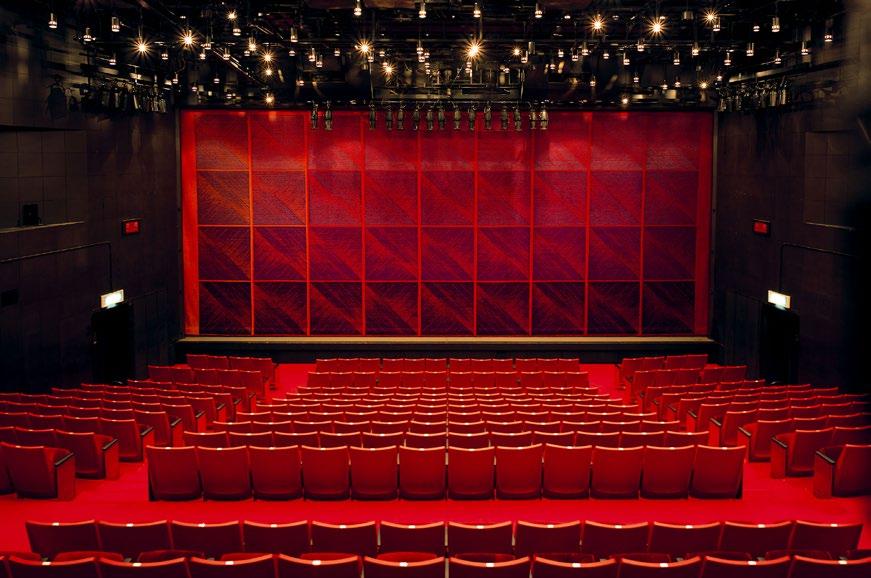
Former PARCO Theater Photograph provided by: PARCO Co., Ltd. Photographer: Nishimura Atsushi
Theatre Topics
A Theatre that Continues to Challenge —The Rebirth of PARCO Theater
Sugiyama Hiromu
The Scramble Intersection in Shibuya is in a festive mood, packed with young people on days when the national football team of Japan wins a match at the world cup. People also gather there for Halloween wearing original clothes and again on New Year’s Eve. In recent years, many foreign visitors flock there to take selfies. The area is now known as a meeting spot for young people but fifty
years ago, it was a quiet town where Shibuya River flowed and residential areas co-existed with red-right districts and restaurants.
Shibuya changed drastically when the Tokyo Olympics took place in 1964. The Olympic Village was built in nearby Yoyogi Park. The swimming competition and basketball games were held at Yoyogi National Gymnasium and weightlifting events at Shibuya Public Hall, and the public broadcaster NHK began to relocate from Uchisaiwaicho to Shibuya. PARCO Theater (called Seibu Gekijo up until 1985) opened in 1973, the year NHK completed relocation. Politics was the centre of focus back then. Shinjuku was the centre of youth culture, where modern theatre productions were performed by Shingeki (i.e. ‘new theatre’) troupes such as Bungakuza and Mingei Theatre Company as well as underground theatre groups. In Ginza and the adjacent Hibiya area, Kabuki and Takarazuka’s revue shows were presented. Shinjuku and the Ginza-Hibiya areas were the two main theatre hubs during that time but when PARCO Theater opened, the theatre map started to change.
One of the main driving forces was the ‘Saison Culture Initiative’, suggesting a new lifestyle to many young people who were looking for something new by organizing cultural infrastructure and PARCO Theater took a central role. They used pop TV commercials and posters for advertisement and also opened affiliated facilities nearby, namely PARCO Museum, Cine Quinto and
Club Quattro to promote what is now called “edgy” culture in the fields of fine arts, movies and music. PARCO Theater also experimented with various kinds of projects besides theatre. In addition to putting on the latest plays written by Abe Kobo and Yamazaki Masakazu, they produced ‘Music Today’, which was planned, organized and supervised by contemporary music composers, Takemitsu Toru and Takahashi Yuji, and became a series. Their programme was full of variety and it included concerts, ballet and contemporary dance performances and fashion. Going to Shibuya meant you could get in touch with something new and stylish. The young generation responded to this strategy.
Yabuhara, the Blind Master Minstrel (1973)
Even from a theatrical point of view, the plays they presented were unique. PARCO Theater produced new plays to find new theatre creators and set a new trend. A music theatre production written by Inoue Hisashi and directed by Kimura Koichi attracted tremendous interest. This was followed by premieres of notable pieces such as Yabuhara, the Blind Master Minstrel (Yabuhara kengyo)(1973), which was invited to the Edinburgh Festival, Shakespeare in the Twelfth Year of the Tempo Era
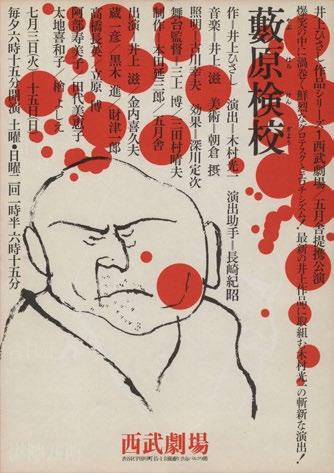
(Tempo juninen no Shakespeare)(1974), which included all thirty-seven plays written by Shakespeare, and Ame (i.e. ‘rain’)(1976), which was a play about people getting tied up by power through conflicts created by words, all of which are known by theatre fans today. PARCO Theater also brought on board the standard-bearers of the underground theatre movement, who had presented ambitious and controversial plays one after another in tent theatres and small theatres, and presented Terayama Shuji’s The Miraculous Mandarin (Chugoku no fushigi na yakunin)(1977) and Duke Bluebeard’s Castle (Aohigeko no shiro)(1979), Tsuka Kohei’s The Day the Atomic Bomb is Dropped on Hiroshima (Hiroshima ni genbaku o otosu hi)(1979), The Story of Shitaya Mannencho (Shitaya mannencho monogatari)(1981) written by Kara Juro and directed by Ninagawa Yukio, and Tango at the End of Winter (Tango fuyuno owarini)(1984), written by Shimizu Kunio and directed by Ninagawa Yukio.
This trend accelerated when PARCO Space Part 3 opened nearby in 1982. At Parco Space Part 3, Miyamoto Amon, who was still unknown, directed Ich bin Weill (1989) and when it was well-received, he was offered to direct musicals at PARCO Theater. He presented Astaire by Myself (1990) and Girls Time (1995) among other productions, which lead to his Pacific Overtures on Broadway (2004). The playwright Mitani Koki also started off at PARCO Space Part 3 with The Gentle Twelve (Juninin no yasashii nihonjin)(1992) and Dah! Dah! Dah! (1993), and later on made his debut at PARCO Theater, which then became his home ground.
He wrote new plays for the theatre starting with No Exit! (Deguchi nashi!)(1994), followed by Nobody Else But You (Kimi to nara)(1995) and By Myself (1997). Academy of Laughter (Warai no daigaku), which was premiered at Aoyama Round Theatre in 1996 and was revived at PARCO Theater in 1998. Mitani has written a total of twen-
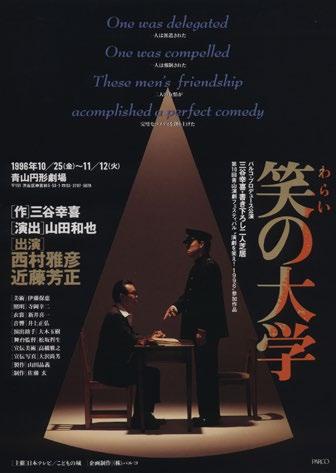
ty-three plays produced by PARCO
Academy of Laughter (1996) Theater. Even after 2000, PARCO Theater continued to commission
young theatre people for its projects; namely Nagatsuka Keishi’s My Rock’n Roll Star (2002), Kudo Kankuro’s Dumb Beast (Donju) (2004), Horai Ryuta’s LOVE 30 (LOVE 30 Otoko to onna no monogatari ‘Ani eno dengon’)(2006), Motoya Yukiko’s [I’m] Happy, [This is] Fantastic, Thank You, Really! (Shiawase Saiko Arigato Majide!)(2008), Maekawa Tomohiro’s Enter Through the Narrow Gate (Semaki mon yori haire)(2009), Iwai Hideto’s A Recluse Wants to Go Outside (Hikky, sotoni detemitano) (2012) and Nozoe Seiji’s My Hole, His Hole (Boku no ana, kare no ana)(2016).
Another major characteristic was that PARCO Theater boldly took on the challenge of presenting foreign plays regarded as difficult to put on at other theatres. The most impressive play was Mart Crowley’s The Boys in the Band (1983), which is about gay men who
gather at a birthday party one night, portraying their solitude, alienation, self-hatred and other dark sides of the human mind. It was premiered on Broadway in 1968 and was made into a movie in 1970 but when you think about the social conditions back then in Japan, it is easy to imagine how much courage it took to present a play with a homosexual man as the central character. The audience supported the production and it was followed by Martin Sherman’s Bent and Harvey Fierstein’s Torch Song Trilogy in 1986, and the series was regarded as ‘a gay trilogy’.
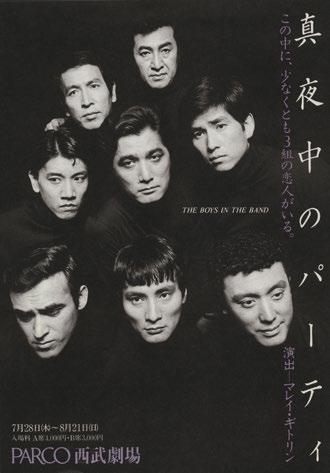
The Boys in the Band (1983)
159
PARCO Theater also premiered Neil Simon’s plays in Japan. Quick to recognise the Broadway-hitmaker, the theatre presented The Odd Couple (1979), Chapter Two (1981) and I Ought to be in Pictures (1982) in a row and created a Neil Simon boom. It also turned the spotlight on the richness of Irish theatre through presenting Martin McDonagh’s black comedy titled The Lieutenant of Inishmore (2003), which was directed by Nagatsuka Keishi, as well as Pillow Man (2004) and The Beauty Queen of Leenane (2007). Caryl Churchill’s Cloud 9, which has a strong social message, was also presented at PARCO Theater, revived several times at PARCO Space Part 3 and then mounted at PARCO Theater again in 1995, making the play into a memorable long-term commitment. It also
presented numerous stimulating productions to the Japanese audience, including Tom Stoppard’s Rosencrantz and Guildenstern Are Dead (1985), David Mamet’s American Buffalo (1986) and a Sam Shepard season consisting of Buried Child, True West and Fool for Love (1986).
During the economic boom in the 1980s and the first half of the 1990s, PARCO also started inviting companies from abroad such as the Georgian State Theatre, Merce Cunningham Dance Company, Theater Na Yugo-Zapade and Oleg Tabakov Theatre from Moscow, Mokwha Repertory Company from South Korea and the Shanghai Kunqu Opera from China. The most impressive foreign company was Cricot 2 led by Tadeusz Kantor based in Krakow in Poland, which presented its masterpiece The Dead Class (1982) and Let the Artists Die (1990), and seeing those productions was enthralling, never to be forgotten. PARCO Theater also invited Compagnie Philippe Genty’s puppet shows, which portrayed dream worlds by integrating pantomime, puppet shows and circus acts. The company’s performances were well received and it was invited back to Japan several times, making a unique achievement for PARCO Theater.
Meanwhile, the two-hander musical Show Girl (1974) and the reading of Love Letters (1990) were small in scale but should be mentioned because they created new trends in the Japanese theatre scene. Show Girl was a stylish love story performed by Hosokawa Toshiyuki and Kinomi Nana with music, dialogues and dance. Fukuda Yoichiro wrote, devised and directed the show
and his sophisticated taste alongside Miyagawa Yasushi’s exquisite choice of music created a show full of fun and surprises. It was put on every year for sixteen years until 1988 and now Mitani Koki has succeeded Fukuda to write and direct the show with Kabira Jay and Sylvia Grab forming the duo. Love Letters is a simple show with an actor and actress sitting on chairs and reading A. R. Gurney’s script written as letters that they wrote to each other. It has been performed with different cast every time and has been kept fresh as the actors only do one read-through before performing the play, which has been performed 467 times over twenty-six years (including readings at venues other than PARCO Theater). Aoi Yoji translated and directed the play but
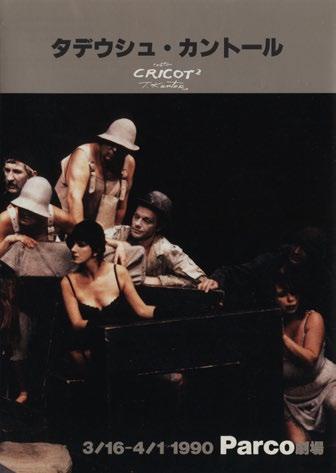
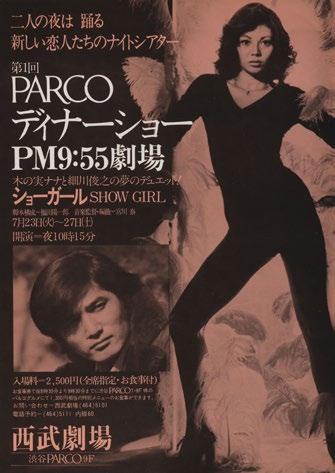
after he passed away, Fujita Shuntaro took over his place and has been directing it since 2017. It is needless to say that this longlasting project was the beginning of ‘dramatic reading’, which has become very popular nowadays.
Unlike star-led productions, in which the cast is decided by the top star, or plays performed by theatre companies, which prioritize some other logic, the producers of PARCO Theater produced shows with the interest of the piece itself in mind, which is the essential model for theatre-making, and this was a significant turning point. Moreover, PARCO Theater was unique in that it carried on its endeavor to create new types of plays for the audience. In other words, they presented a consistent image by putting on pieces that matched their policy, welcomed by curious young people and created the atmosphere of Shibuya. It is not too much to say that Shibuya was formed through a culture emanating from theatre. PARCO’s competitor Tokyu Group, which also owns a railway company and a department store, opened theatre facilities one after another in Shibuya. The first one was a large-scale cultural complex called Bunkamura that opened in 1989, containing Orchard Hall and Theatre Cocoon. Cerulean Tower Noh Theatre followed in 2001 and then Theatre Orb in 2012. In this way, they have enhanced their image as a cultural provider. The Tokyu Group has undoubtedly been influenced by the Saison Culture, and Shibuya has now become one of the hubs for theatre performances.
Public theatres, namely Tokyo Metropolitan Theatre that
opened in 1990, Saitama Arts Theater that opened in 1994, and the New National Theatre, Tokyo and Setagaya Public Theatre that opened in 1997, have continued to create new productions by appointing directors as their artistic directors. The theatre distribution map is about to change once again but even though the theatre closed in 2016, PARCO Theater’s production team has staged Mishima Yukio’s The Sea of Fertility (Hojo no umi) in 2018 and has continued to present stimulating pieces such as Ferdinand von Schirach’s court drama Terror (2018), Lucy Kirkwood’s Children (2018), which reminds us of the Fukushima Nuclear Power Plant incident, and Lucas Hnath’s A Doll’s House, Part 2 (2019), which is a sequel to the modern classic play. As long as they stick to their challenging policy, they will keep providing topics and expectations, since PARCO Theater has no small role to play in the Japanese theatre scene.
Sugiyama, Hiromu A theatre journalist. He was born in Shizuoka in 1957. He joined Yomiuri Newspaper in 1981. For around thirty years until 2017, he wrote theatre articles and reviews as well as running the Yomiuri Theatre Awards. He is also the director of the Association of Japanese Theatre Companies and a member of the selection committee of Hayakawa Tragedy and Comedy Award.
Visuals of flyers provided by: PARCO Co., Ltd.
(Translation: Sumida Michiyo)




